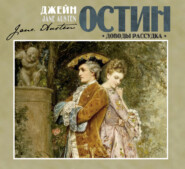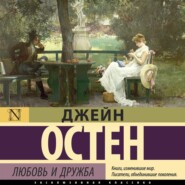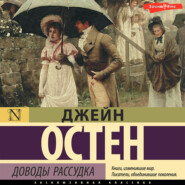По всем вопросам обращайтесь на: info@litportal.ru
(©) 2003-2025.
✖
Sense and Sensibility / Чувство и чувствительность. Уровень 3
Настройки чтения
Размер шрифта
Высота строк
Поля
This increased the mirth of the company.
“Oh! Miss Margaret, let us know all about it,” said Mrs. Jennings. “What is the gentleman’s name?”
“I must not tell, ma’am. But I know very well what it is; and I know where he is too.”
“Yes, yes, we can guess where he is; at his own house at Norland to be sure. He is the curate of the parish I dare say.”
“No, that he is not.”
“Margaret,” said Marianne, “you know that all this is an invention of your own, and that there is no such person in existence.”
“Well, then, he is lately dead, Marianne, for I am sure there was such a man once, and his name begins with an F.”
Lady Middleton observed, at this moment, “that it rained very hard”. The idea was immediately pursued by Colonel Brandon. Willoughby opened the piano-forte, and asked Marianne to sit down to it.
A party was formed this evening for going on the following day to see a very fine place about twelve miles from Barton. It belonged to a brother-in-law of Colonel Brandon, who was then abroad.
To somebody it appeared rather a bold undertaking, considering the time of year, and that it had rained everyday for the last fortnight. Elinor persuaded Mrs. Dashwood, who had already a cold, to stay at home.
Chapter XIII
Their excursion to Whitwell turned out very different from what Elinor had expected. She was prepared to be wet through, fatigued, and frightened; but the event was still more unfortunate, for they did not go at all.
By ten o’clock the whole party was assembled at the park, where they ready to breakfast. The morning was rather favourable, though it had rained all night.
While they were at breakfast the letters were brought in. Among the rest there was one for Colonel Brandon. He took it, looked at the direction, changed colour, and immediately left the room.
“What is the matter with Brandon?” said Sir John.
Nobody could tell.
“I hope he has had no bad news,” said Lady Middleton. “It must be something extraordinary that could make Colonel Brandon leave my breakfast table so suddenly.”
In about five minutes he returned.
“No bad news, Colonel, I hope;” said Mrs. Jennings, as soon as he entered the room.
“None at all, ma’am, I thank you.”
“Was it from Avignon? I hope it is not to say that your sister is worse.”
“No, ma’am. It came from town, and is merely a letter of business.”
“But why does it discompose you so much, if it is only a letter of business? Come, come, Colonel; so let us hear the truth of it.”
“My dear madam,” said Lady Middleton, “recollect what you are saying.”
“Well, then, I know who it is from, Colonel. And I hope she is well.”
“Whom do you mean, ma’am?” said he.
“Oh! you know who I mean.”
“I am particularly sorry, ma’am,” said he, addressing Lady Middleton, “that I receive this letter today, for it is on business which requires my immediate attendance in town.”
“In town!” cried Mrs. Jennings. “What will you do in town at this time of year?”
“I am very sorry,” he continued, “to leave you; as I fear my presence is necessary to gain your admittance at Whitwell.”
“But if you write a note to the housekeeper, Mr. Brandon,” said Marianne, eagerly, “will it not be sufficient?”
He shook his head.
“We must go,” said Sir John. “You cannot go to town till tomorrow, Brandon, that is all.”
“It is not in my power to delay my journey for one day!”
“Let us know what your business is,” said Mrs. Jennings, “and we’ll see whether it can be put off or not.”
Elinor then heard Willoughby say, in a low voice to Marianne,
“There are some people who cannot bear a party of pleasure. Brandon is one of them. He is afraid of catching cold I dare say, and invented this trick. The letter is of his own writing.”
“I have no doubt of it,” replied Marianne.
“Well, then, when will you come back again?”
“It is very uncertain.”
“Oh! he must come back,” cried Sir John. “If he is not here by the end of the week, I shall go after him.”
“So do, Sir John,” cried Mrs. Jennings, “and then perhaps you may find out what his business is. I wish you a good journey. But you must change your mind.”
“I assure you it is not in my power,” said the Colonel.
To Marianne, he merely bowed and said nothing. He wished Mrs. Jennings a good morning and left the room.
“I can guess what his business is, however,” said Mrs. Jennings exultingly.
“Can you, ma’am?” said almost everybody.
“Yes; it is about Miss Williams, I am sure.”
“And who is Miss Williams?” asked Marianne.
“What! do not you know who Miss Williams is? She is a relation of the Colonel’s, my dear; a very near relation.” Then, lowering her voice a little, she said to Elinor, “She is his natural daughter[12 - natural daughter – незаконнорожденная дочь].”
“Indeed!”
“Oh! Miss Margaret, let us know all about it,” said Mrs. Jennings. “What is the gentleman’s name?”
“I must not tell, ma’am. But I know very well what it is; and I know where he is too.”
“Yes, yes, we can guess where he is; at his own house at Norland to be sure. He is the curate of the parish I dare say.”
“No, that he is not.”
“Margaret,” said Marianne, “you know that all this is an invention of your own, and that there is no such person in existence.”
“Well, then, he is lately dead, Marianne, for I am sure there was such a man once, and his name begins with an F.”
Lady Middleton observed, at this moment, “that it rained very hard”. The idea was immediately pursued by Colonel Brandon. Willoughby opened the piano-forte, and asked Marianne to sit down to it.
A party was formed this evening for going on the following day to see a very fine place about twelve miles from Barton. It belonged to a brother-in-law of Colonel Brandon, who was then abroad.
To somebody it appeared rather a bold undertaking, considering the time of year, and that it had rained everyday for the last fortnight. Elinor persuaded Mrs. Dashwood, who had already a cold, to stay at home.
Chapter XIII
Their excursion to Whitwell turned out very different from what Elinor had expected. She was prepared to be wet through, fatigued, and frightened; but the event was still more unfortunate, for they did not go at all.
By ten o’clock the whole party was assembled at the park, where they ready to breakfast. The morning was rather favourable, though it had rained all night.
While they were at breakfast the letters were brought in. Among the rest there was one for Colonel Brandon. He took it, looked at the direction, changed colour, and immediately left the room.
“What is the matter with Brandon?” said Sir John.
Nobody could tell.
“I hope he has had no bad news,” said Lady Middleton. “It must be something extraordinary that could make Colonel Brandon leave my breakfast table so suddenly.”
In about five minutes he returned.
“No bad news, Colonel, I hope;” said Mrs. Jennings, as soon as he entered the room.
“None at all, ma’am, I thank you.”
“Was it from Avignon? I hope it is not to say that your sister is worse.”
“No, ma’am. It came from town, and is merely a letter of business.”
“But why does it discompose you so much, if it is only a letter of business? Come, come, Colonel; so let us hear the truth of it.”
“My dear madam,” said Lady Middleton, “recollect what you are saying.”
“Well, then, I know who it is from, Colonel. And I hope she is well.”
“Whom do you mean, ma’am?” said he.
“Oh! you know who I mean.”
“I am particularly sorry, ma’am,” said he, addressing Lady Middleton, “that I receive this letter today, for it is on business which requires my immediate attendance in town.”
“In town!” cried Mrs. Jennings. “What will you do in town at this time of year?”
“I am very sorry,” he continued, “to leave you; as I fear my presence is necessary to gain your admittance at Whitwell.”
“But if you write a note to the housekeeper, Mr. Brandon,” said Marianne, eagerly, “will it not be sufficient?”
He shook his head.
“We must go,” said Sir John. “You cannot go to town till tomorrow, Brandon, that is all.”
“It is not in my power to delay my journey for one day!”
“Let us know what your business is,” said Mrs. Jennings, “and we’ll see whether it can be put off or not.”
Elinor then heard Willoughby say, in a low voice to Marianne,
“There are some people who cannot bear a party of pleasure. Brandon is one of them. He is afraid of catching cold I dare say, and invented this trick. The letter is of his own writing.”
“I have no doubt of it,” replied Marianne.
“Well, then, when will you come back again?”
“It is very uncertain.”
“Oh! he must come back,” cried Sir John. “If he is not here by the end of the week, I shall go after him.”
“So do, Sir John,” cried Mrs. Jennings, “and then perhaps you may find out what his business is. I wish you a good journey. But you must change your mind.”
“I assure you it is not in my power,” said the Colonel.
To Marianne, he merely bowed and said nothing. He wished Mrs. Jennings a good morning and left the room.
“I can guess what his business is, however,” said Mrs. Jennings exultingly.
“Can you, ma’am?” said almost everybody.
“Yes; it is about Miss Williams, I am sure.”
“And who is Miss Williams?” asked Marianne.
“What! do not you know who Miss Williams is? She is a relation of the Colonel’s, my dear; a very near relation.” Then, lowering her voice a little, she said to Elinor, “She is his natural daughter[12 - natural daughter – незаконнорожденная дочь].”
“Indeed!”

















